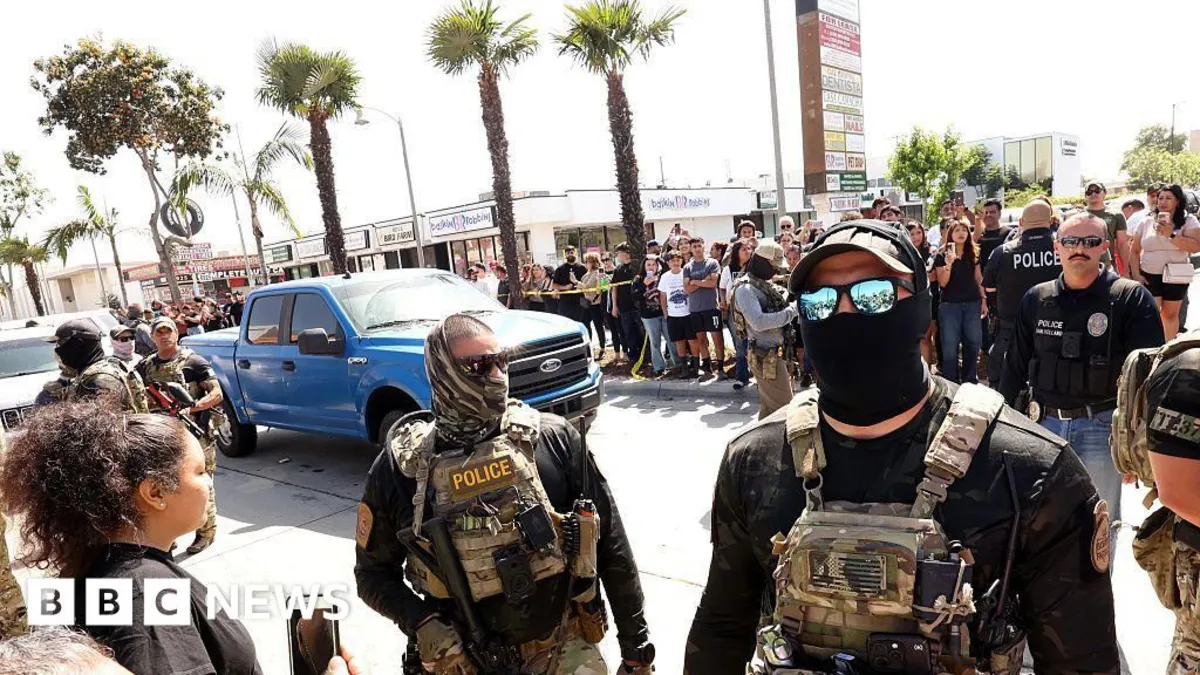
The U.S. Supreme Court has made a significant ruling, allowing sweeping immigration raids in Los Angeles to continue for the time being. This decision overturns a federal judge's order that had previously prohibited agents from conducting stops without reasonable suspicion. The ruling, delivered on a Monday, represents a notable victory for President Donald Trump, who has been vocal about his plans to implement record-level deportations of migrants residing in the country illegally.
In a 6-3 decision from the conservative-majority court, the justices have permitted agents to stop individuals based on factors such as race, language, or job. This ruling will remain in place while a legal challenge regarding the recent immigration sweeps in Los Angeles proceeds through the judicial system. The dissenting liberal justices expressed concern, arguing that this decision endangers constitutional freedoms.
Justice Brett Kavanaugh, writing for the majority, stated that the lower court's restraining order excessively limited the capabilities of Immigration and Customs Enforcement (ICE) agents regarding the questioning and stopping of suspected unlawful migrants. Kavanaugh clarified that while ethnicity alone cannot establish reasonable suspicion, it can be considered a 'relevant factor' when combined with other significant elements.
The ruling has drawn sharp criticism from various quarters, including Los Angeles Mayor Karen Bass, a Democrat, who described the decision as "dangerous" and "un-American," asserting that it threatens the very fabric of personal freedom in the United States. Justice Sonia Sotomayor, one of the three liberal justices, articulated a passionate dissent, noting that many individuals in Los Angeles have been unlawfully detained based solely on their appearance, accents, or the nature of their work.
This Supreme Court decision lifts an earlier order issued by U.S. District Judge Maame E. Frimpong, who had determined that there was substantial evidence indicating that the immigration raids were unconstitutional. Judge Frimpong had previously halted the raids, emphasizing that factors such as race, ethnicity, or simply speaking Spanish should not be grounds for stopping or questioning individuals.
The judge also prohibited immigration agents from conducting stops based solely on someone's presence in certain locations, such as bus stops or agricultural sites, and criticized the practice of targeting individuals based on their occupation. This temporary restraining order was part of a legal challenge initiated by immigration advocacy groups, who contended that immigration officers were conducting indiscriminate roving patrols and denying individuals access to legal representation.
The Supreme Court, while allowing the raids to continue, suggested that the administration's actions might ultimately be deemed constitutional by federal courts. Although the ruling specifically pertains to Judge Frimpong's temporary restraining order, it provides insight into how the justices may approach the case if an appeal arises in the future.
Lawyers for the Department of Homeland Security defended the operations, asserting that immigration officers are targeting individuals based on their legal status rather than their race or ethnicity. They criticized Judge Frimpong's order as an unwarranted limitation on ICE's operational capabilities.
Since June, the Trump administration has intensified immigration raids in Los Angeles, targeting locations like Home Depot and other workplaces, sparking immediate protests and civil unrest. In response to these developments, Trump deployed nearly 2,000 National Guard troops and 700 Marines, despite lacking authorization from the state of California. A subsequent federal ruling deemed this deployment illegal, leading the White House to accuse the judge of attempting to undermine presidential authority to maintain order.
As the Trump administration seeks to enhance law enforcement measures in various cities, including Washington D.C., the Supreme Court's decision to permit ongoing immigration raids marks a pivotal moment in the ongoing debate surrounding immigration policy and enforcement in the United States. Trump has indicated plans to bolster federal law enforcement in Chicago as well, further escalating the administration's crackdown on illegal immigration.